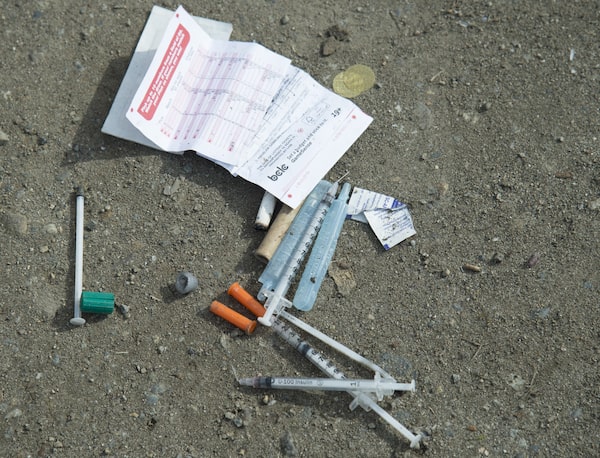
Needles on the ground in Oppenheimer park in Vancouver's downtown eastside on March 17, 2020.JONATHAN HAYWARD/The Canadian Press
British Columbia’s New Democratic Party government’s blind spot on public safety was on display this week, with the promise of a task force to draft a policy around open use of illicit drugs and possession of weapons in the province’s hospitals.
For more than a year, hospital workers have watched the use of illicit substances increase after the implementation of the province’s decriminalization policy, raising concerns for the safety of staff and patients alike. The province’s response followed a predictable pattern when it comes to matters of law and (dis)order: Deny, deflect and downplay, and if that doesn’t work, promise to study the matter. Action may follow, but only after the problems have grown to the point that they are difficult to remedy.
Since Jan. 31, 2023, adults in B.C. are not being arrested or charged for possessing small amounts of certain illegal drugs most commonly associated with overdoses. Nor are their drugs seized.
Decriminalization was meant to reduce stigma that can get in the way of addictions treatment – not to allow drug use anywhere. But the harm reduction policy has introduced an era of permissiveness with widespread repercussions.
Since the policy change, hospital workers have reported a marked increase in the use of illicit substances in patient rooms and bathrooms – even in the maternity unit of Victoria General. That puts front-line workers and other patients at risk of exposure to drugs that can be lethal in small doses. As well, there are more episodes of violent and aggressive behaviour related to patients under the influence, and patients carrying shanks or knives. Hospitals are less safe, something that has been documented by WorkSafeBC investigations.
Last summer, an internal memo from a northern hospital provided the following guidance to staff: Because of decriminalization, patients can have and use illicit drugs in their hospital rooms, and visitors can bring unlawful substances in without fear of search or seizure. In terms of weapons, blades under 10 centimetres in length should be ignored.
A leaked copy of the document was released by the BC United opposition earlier this month. In response, the government said the formal Northern Health policy was less lenient. This week, Health Minister Adrian Dix promised a task force to produce a provincewide policy that will clearly prohibit weapons in hospitals, and will permit illicit drug use only in designated spaces within or around health care facilities.
That tepid response is in keeping with other public safety issues that have flared up in the province. In 2022, before decriminalization, it took a concerted effort of urban mayors to prompt action about repeat, violent offenders, which resulted in a directive to Crown prosecutors to seek detention instead of bail in such cases.
In 2023, mayors and police chiefs worked for months to persuade the Eby government to act on rising drug use in parks, playgrounds and other public places in the wake of decriminalization. The province did eventually introduce a law to restrict drug use in certain places. But the law was put on ice in December before it came into effect by the B.C. Supreme Court, citing harm to drug users. That was upheld by the B.C. Court of Appeal last month. The government is now handcuffed from seeking the reforms that it had been urged to put in place before decriminalization came into force.
Analysis: B.C.’s decriminalization trial faces increasing challenges after first year
The B.C. government initially dismissed concerns that some opioids prescribed under its “safer supply” program are being diverted into the illicit drug trade. Police have swept up prescription bottles that are used in the program in a series of drug-trafficking busts, although senior RCMP officials have said there is “no evidence to support a widespread diversion.” The province also asserted there is no evidence of widespread diversion. The evidence was lacking because the province wasn’t tracking it, but the B.C. Auditor-General’s calls for transparency and accountability on diversion this year are being grudgingly met.
From a political standpoint, as the province rolls toward a fall election, the NDP appear to be ceding a law-and-order agenda to their opponents, a risky stand in a province where public safety is a significant public issue.
Politics aside, on matters of public safety, the NDP government should not be dragging its heels. Even if this is not a core priority for B.C.’s progressive government, it is nonetheless a duty to the province’s citizens.